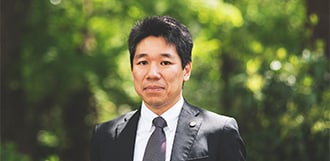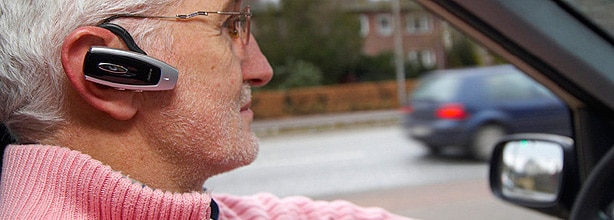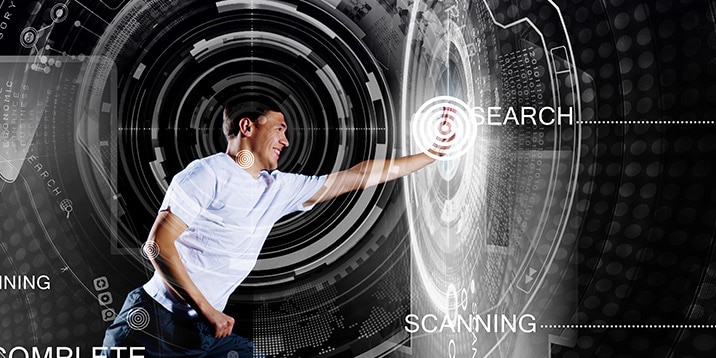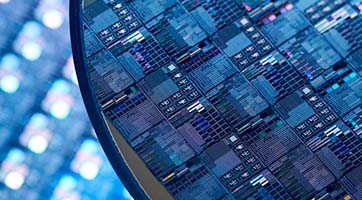
- Semiconductor Technology Now
Expert Interview
Will a network of persons with cancer change the future of medical treatment?
June 21, 2019
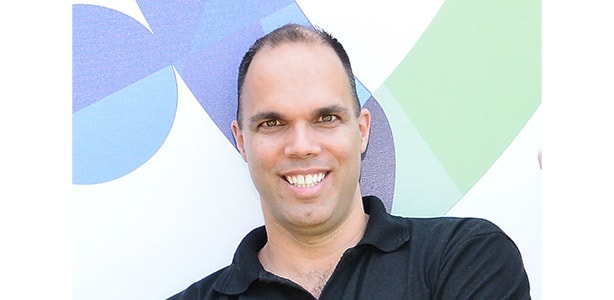
Belong.life: an SNS used by more than 200 thousand persons diagnosed with cancer. The app, which provides a place for people with cancer to share their experiences and gather information as well as have their questions answered by experts, has a rating of 4.8 points (iOS). Another feature of the Belong.life app is that it makes use of machine learning and AI to provide the right information at the right time to be a helpful partner to its users along their journey. AI is also utilizing users’ medical data to contribute to new cancer treatments in the future. Belong.life’s commitment to streamlining the field of medical treatment and alleviating the loneliness that so many people with cancer face takes social network systems one more step forward a new way to make use of technology.
Telescope Magazine: Tell me why you started this service.
Irad Deutsch: I’ll tell you a little bit about how it all started. My partner’s name is Eliran Malki. He is the CEO of the company. We founded Belong in 2015 after we both lost our loved ones to cancer. I lost my mom to lung cancer. It’s called non-small lung cancer. She was completely healthy. She was eating the right things. She was jogging and everything and she was not a smoker and yet it hit her. This was at the beginning and Eliran also experienced cancer in his family. We both came from the big data industry and both had quite a few successful startups. We include bottom lines on businesses using technology, using data-driven technologies, data analytics and AI. Even before it was called “big data” I had been doing this kind of work. But when we actually realized that we had made so many mistakes in the process of taking care of our loved ones -- and there’s a lot of mistakes cancer patients make in their journey -- we wanted to harness everything that we had learned in our careers and take all this technical expertise and technology to improve people’s lives and not only the bottom line of big organizations. We noticed there’s a huge need for patients to get the right information at the right time, and this is something that technology can bridge.
Telescope Magazine: What mistakes did you make with your mother’s illness?
Irad Deutsch: When my mom was in care, at some point the treatment stopped working. I was looking for a clinical trial that was relevant to her situation. There was one, literally around the corner of where we lived, and I missed that. You have tons of information around you but you can’t really process everything. There is a database of 250,000 cases in clinical trials alone. This is something that computers can bridge, for example.
Telescope Magazine: Utilizing AI to match symptoms and clinical tests has become quite a big thing these days. What other ways are you considering to make use of AI?
Irad Deutsch: Big data can bridge the gap but the other thing we wanted to solve for cancer patients was the loneliness aspect of cancer. I’ll give you an example about my mother. She didn’t want anyone to know that she was sick because when you are sick with cancer people look at you as a zombie because you’re going to be banished sooner or later and they don’t hire you; they don’t connect with you emotionally. They tag you. These are things that people do not do intentionally, but it’s how the mind works. Because of this loneliness, people with cancer don’t speak about it; they don’t talk about it. They hide. They hide it from their co-workers and their friends, sometimes from family members. We wanted to break this loneliness also using technology and allow them to find friends, to talk to experts, and to work with other people without compromising their identity.
Telescope Magazine: About how many users does Belong.life have?
Irad Deutsch: We have 200,000 cancer patients globally. The majority is in the U.S., but 130 countries around the globe are using Belong. We provide patients with accurate information, direct access to physicians and a virtual care team, over 100 insurance providers, HMOs, emotional support and also provide them with tools to organize all their documents, providing input from other patients, clinical trials, and a lot of things.
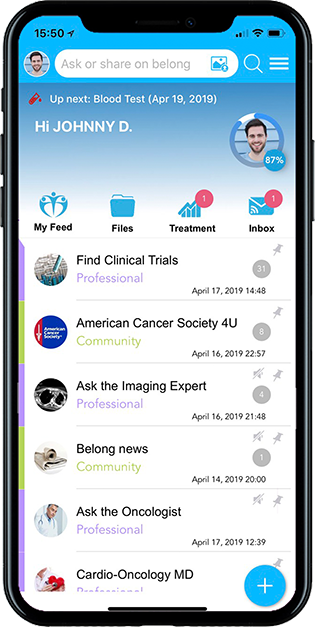 |
Telescope Magazine: You say you connect the patients with the physicians and other patients who are members, so is it like Facebook? What’s the difference? Can you form a group?
Irad Deutsch: The number one thing that distinguishes Belong from Facebook is that all the people are anonymous. On Facebook, everybody knows who you are because this is where you share your personal life with other people so they know you by name and by picture. If you start out with – “Hey guys, I’m stage four cancer,” then you still lose all your friends at some point. It’s not something people do on Facebook. They do chat if they’re stage one and they’re about to get back to work in three months, then they are pretty chatty about this. But after stage one, stage two, which is more serious, they don’t shout it out. I remember in my personal case, I wanted to tell the universe that my mom had cancer because I wanted to find information that I couldn’t get on my own, but she didn’t allow me to do this. She didn’t want just anyone to know about this. So first of all, anonymity is the number one thing in Belong.
Telescope Magazine: So anonymity is of utmost importance here.
Irad Deutsch: The second thing is that we have professionals. Neither Facebook or Google or the rest of the Internet are regulated in the terms of what data you are exposed to. You see a lot of things that are irrelevant, a lot of nonsense; a lot of opinions from non-experts. With Belong you have both. You have information from other patients who have been there before, people who can give you tips on what to do, comment on what you have been doing well, what worked for them, or what didn’t work for them. Then you have a virtual care team that doesn’t provide you with medical advice but with relevant information. If you get your CAT scan result you have a radiologist whom you can talk to and ask questions – like when he says that my nodule is three times bigger, I can ask him what the nodule is, why this thing matters, and what is the protocol? “I’ve been treated with this drug. Is this common or is it something that my doctor did for another reason? I don’t understand why I’m given this treatment,” etc. Patients only have a few minutes with their doctor and when they walk out of the clinic they have so many questions, so many fears; and the Belong Virtual Care Team allows them to get answers to all those questions. If you’re dealing with pain there is a pain expert. If you go through radiation there is a radiation expert. If you have lung cancer you have a lung cancer expert. Even if you have problems in your sexual life with your spouse there is a sexual therapist to actually answer your questions. Beyond that, we have a lot of other things people can do with Belong. People can manage, organize and present all their medical binders, and all their medical files, but we allow them to delete their identities before they do it. They have a journal in which they write down their to-do tasks. For example, “I have an MRI tomorrow.” The system will notify them, we’ll provide them with tips from other patients who have gone through this already and what they have learned.





